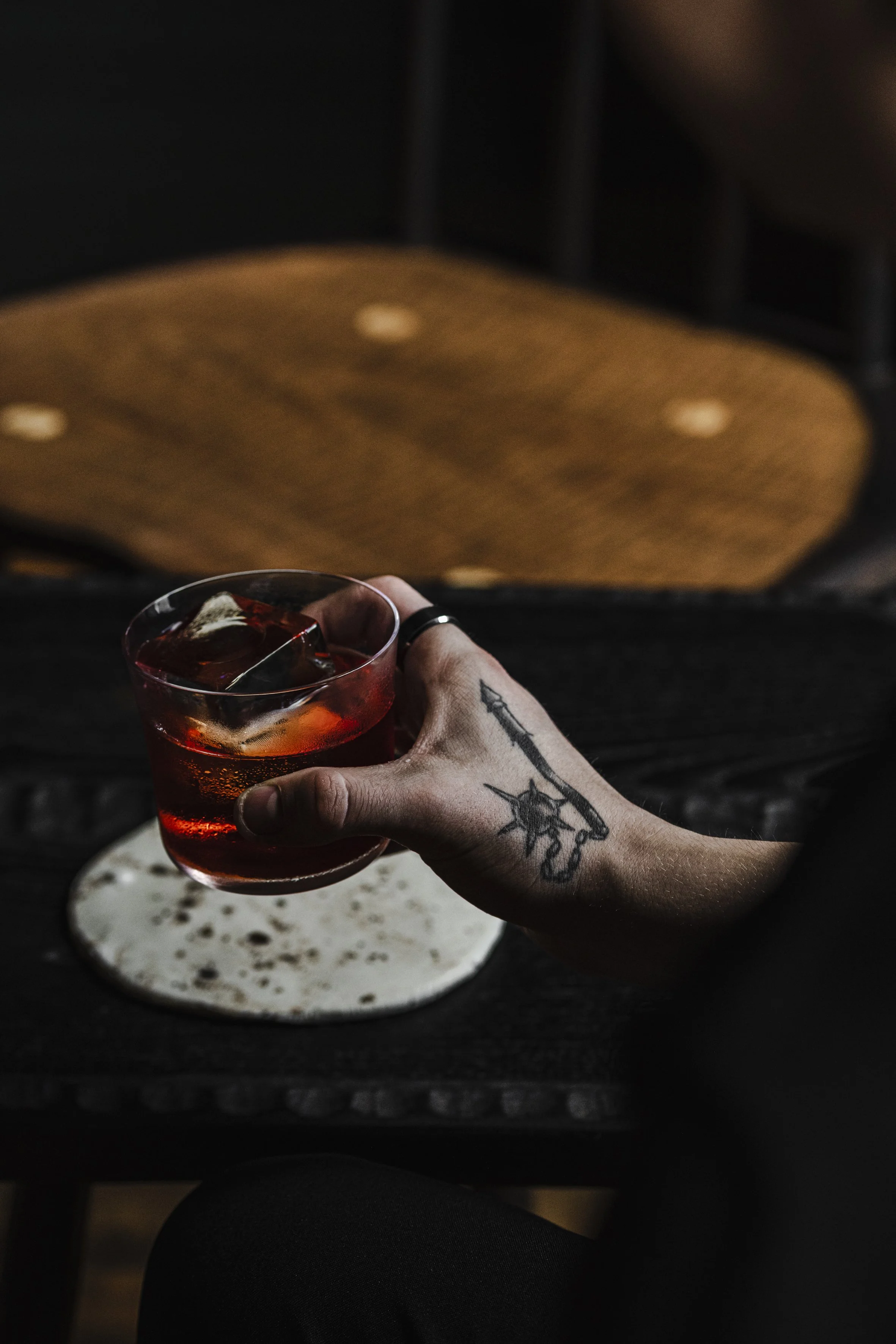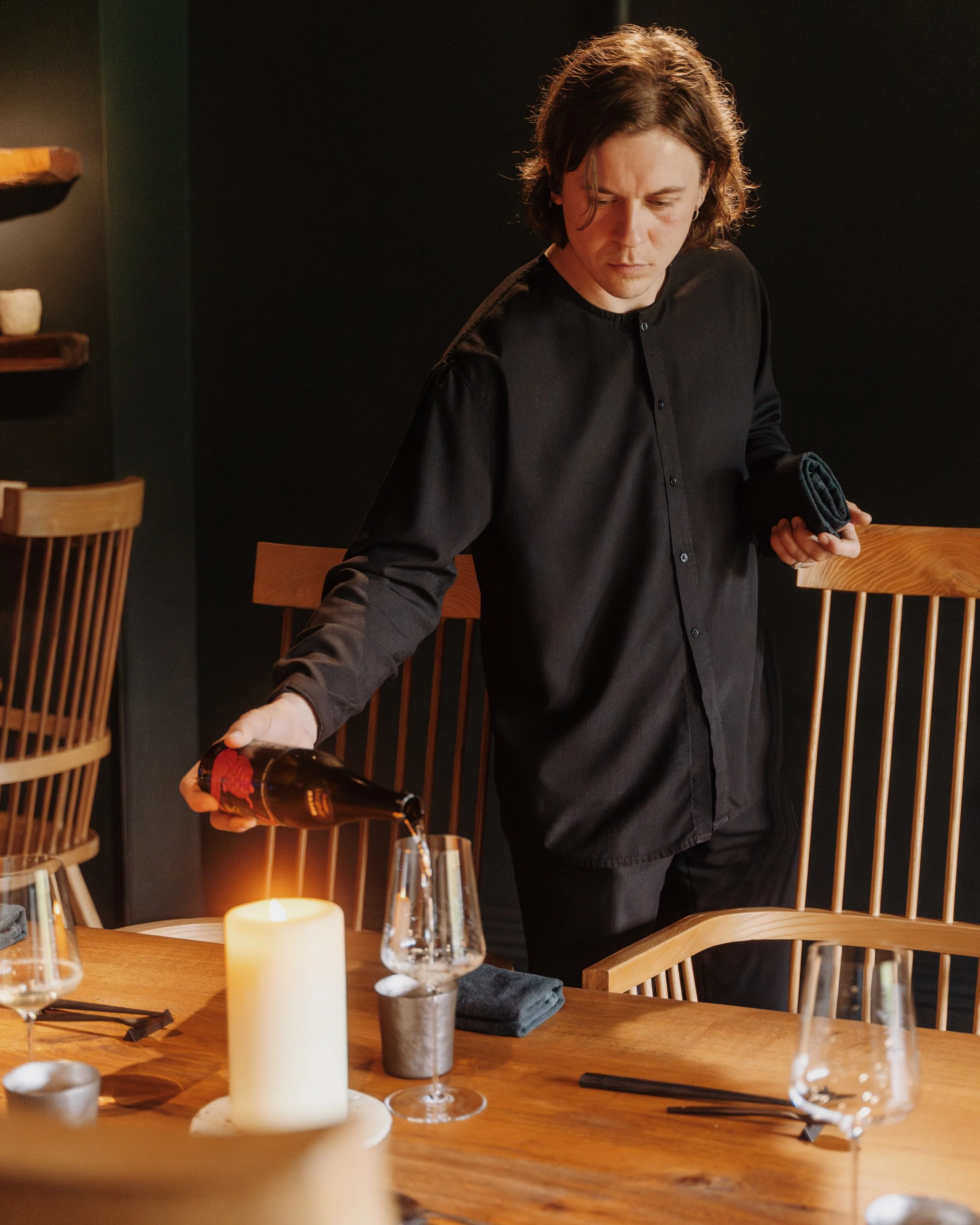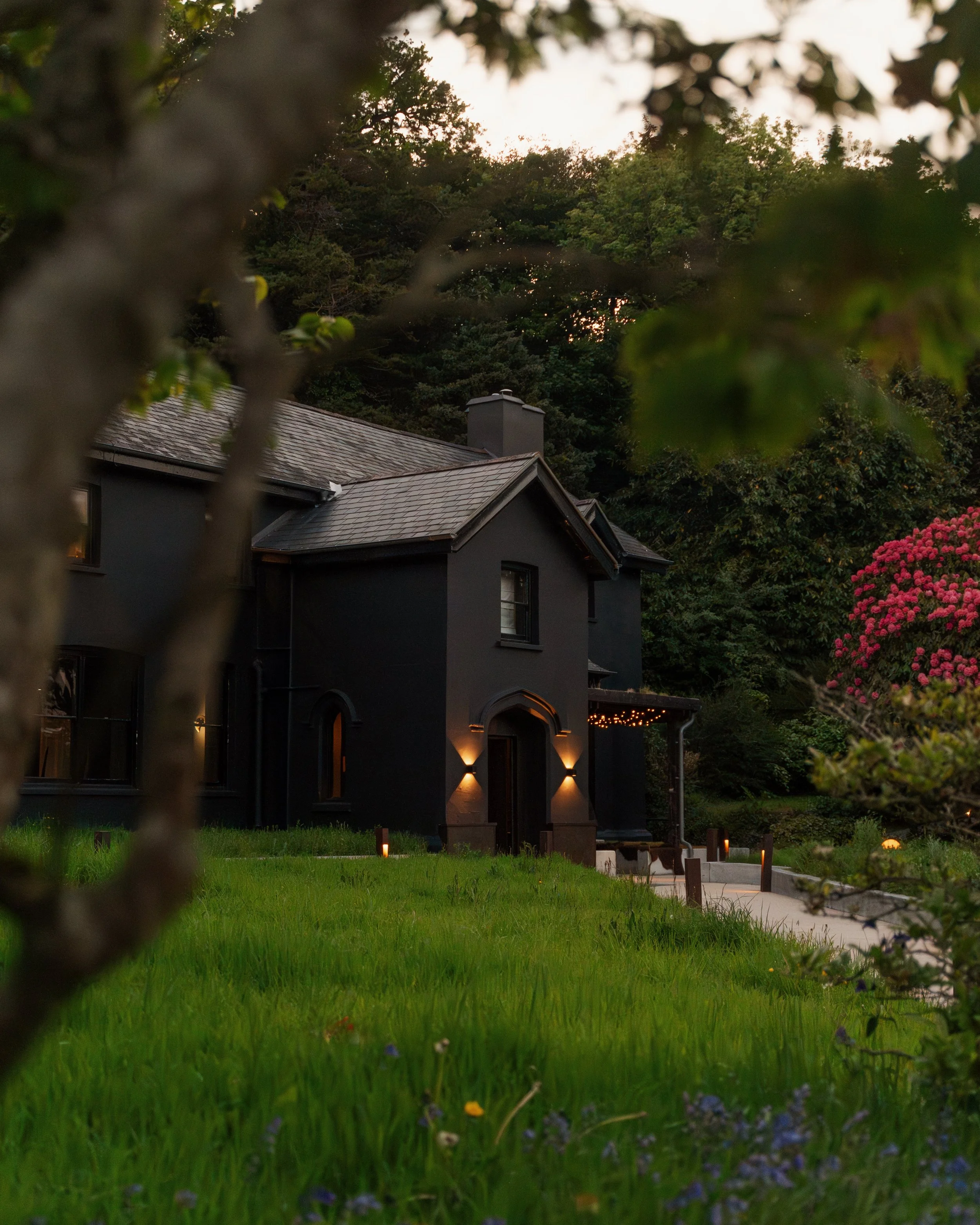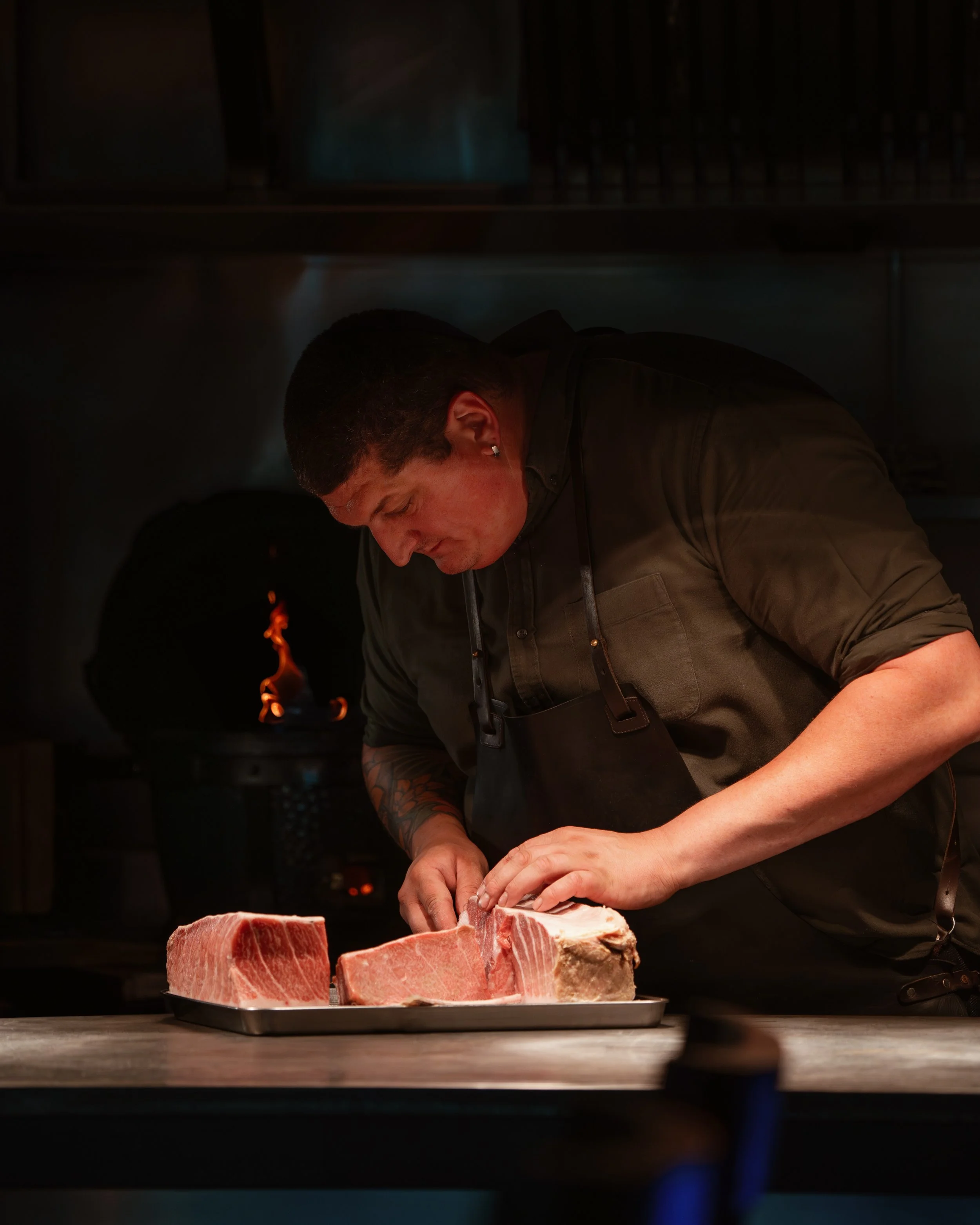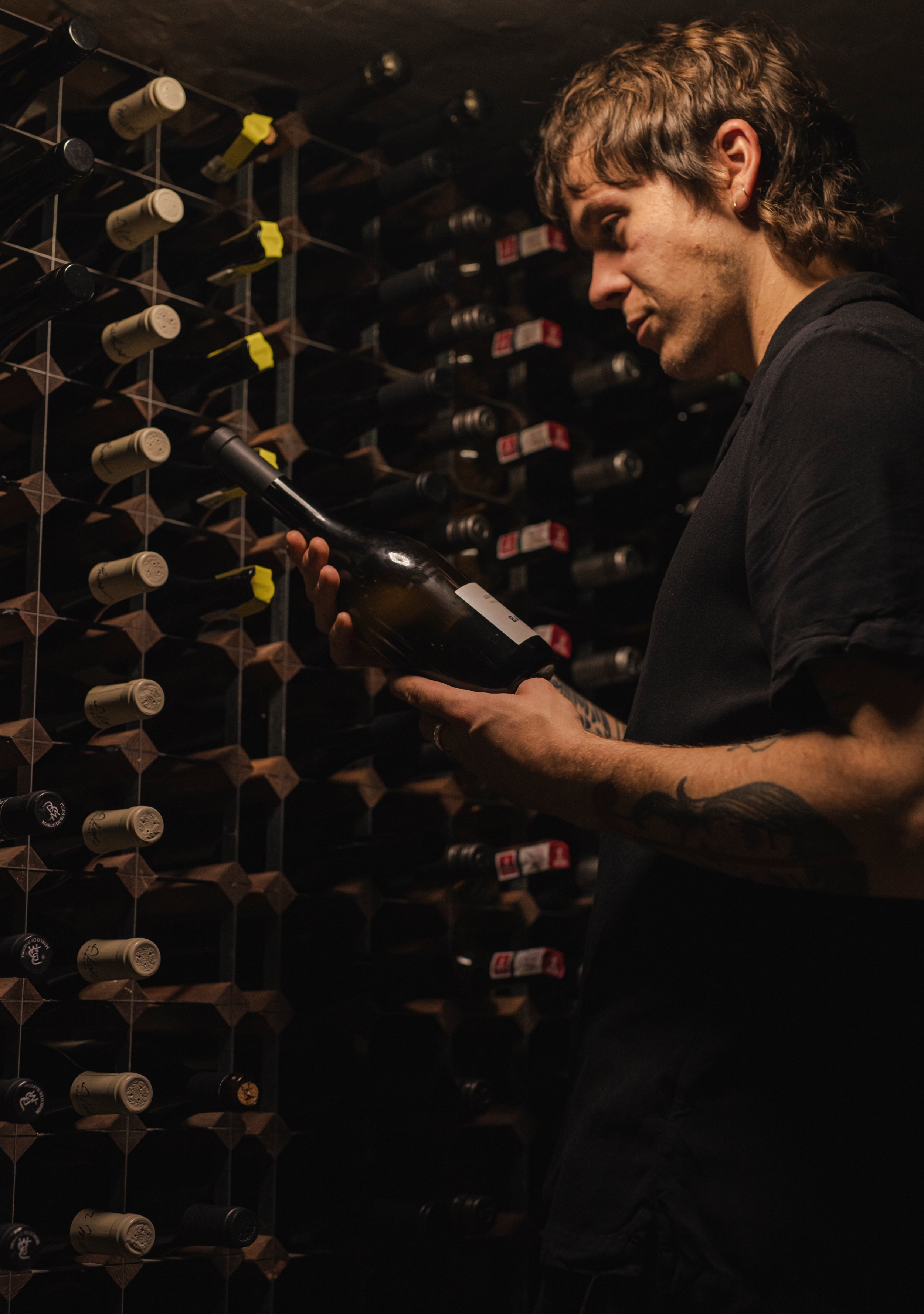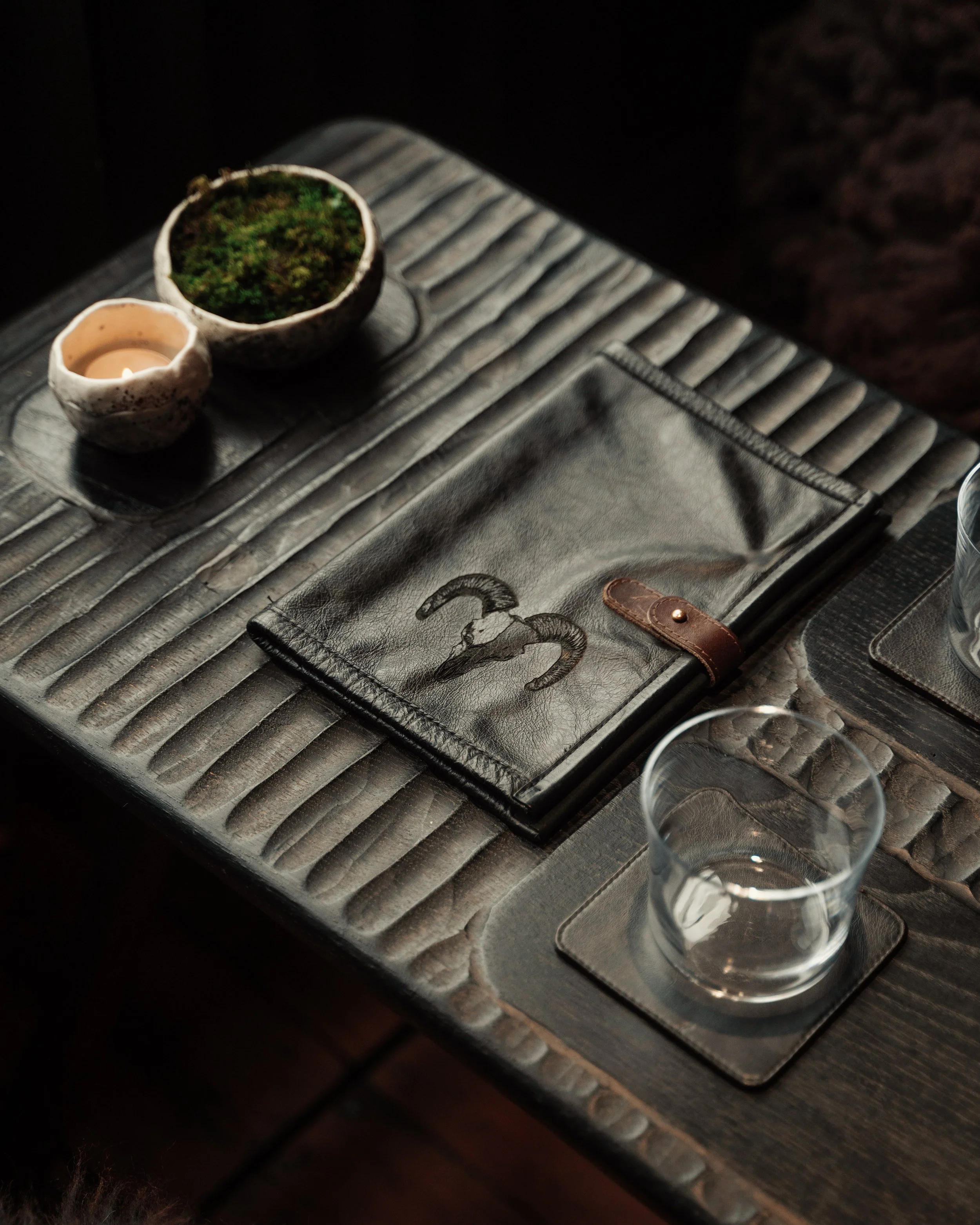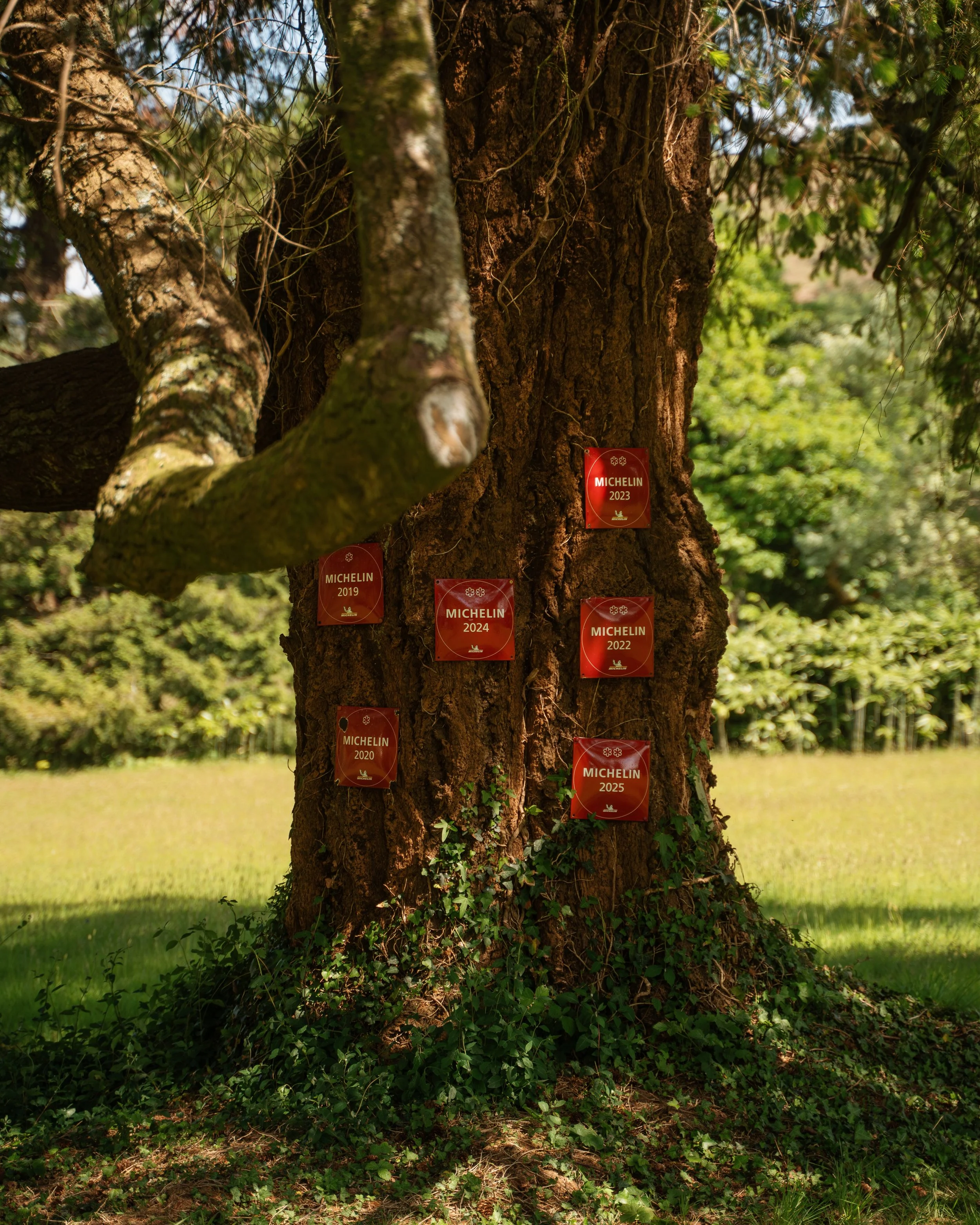Beyond the Wine List: How Rory Eaton Is Redefining Drinks at Ynyshir
Tucked away in rural Wales, miles from the nearest shop and a world away from the city, Ynyshir Restaurant and Rooms feels almost like its own small universe. Vinyl records spin on a turntable, a mirror ball throws light across the dining room, guests drift out to a firepit with cigars and nightcaps, and somewhere in the middle of it all is Wine and Beverage Director, Rory Eaton - quietly orchestrating some of the most original, personal and thought-provoking drinks pairings in the UK.
For Rory, the drinks experience at Ynyshir goes far beyond “what works with the food”. It’s about curiosity, regenerative farming, storytelling, human connection - and a deep belief that wine and hospitality don’t need to be intimidating to be serious.
A seed planted in Bordeaux
Rory’s route into wine began not with a grand plan, but a moment of hesitation.
“The year I left college was the year they changed the university fees,” he recalls. “I wasn’t really sure I wanted to go, and I wasn’t exactly sure what I wanted to study. So I thought, I’ll take a year out - and I moved to France.”
He headed to Bordeaux with two friends, grape-picking and travelling around Europe. At the time, he had no intention of turning it into a career. But, as he says, “maybe it planted a seed of something that grew later”.
Back in the UK, in need of money, he took a job in a large chain restaurant. The cocktail bar looked glamorous, but all the positions were filled, so he started as a waiter and pushed for cross-training.
“The training programme was actually brilliant,” he says. “It gave a really solid base, but it was pretty much solely on cocktails.”
From there, a friend tempted him to a smaller independent group in suburban Birmingham - a busy venue with space for 350 people outside and, crucially, a tiki cocktail bar.
“That was my world at the time - cocktails, spirits, beer, cider. Wine just wasn’t the focus yet.”
The wine bar that changed everything
The turning point came when that company decided to open a wine bar about a decade ago and asked Rory to help build the drinks side.
“I was brought in to do all the cocktail, beer and spirits stuff,” he explains. “And I was working with my colleague and friend Abby, who came in to run the wine side.”
Abbie and her family were deeply rooted in wine. They’d been among the first wine suppliers in Birmingham, and she later went on to open her own wine bar. She also pushed Rory to formalise his knowledge.
“She put me through my WSET, and it all kind of snowballed. I started finding out more about wine, interesting producers. It opened my eyes.”
The wine bar itself was ahead of the curve: a spiral cellar sunk into the middle of the room; small plates before “small plates wine bar” was a cliché; a mix of classic, organic, biodynamic and natural producers; and everything from house wines to premium bottles served by the glass via Enomatic machines.
“Back then, that kind of place hadn’t really taken off yet,” Rory says. “We had classic premium stuff, mid-range wines by the glass, and then these more left-field bottles. It was a brilliant playground.”
One South African producer became a personal obsession: Peter Walser of Blank Bottle.
“I remember trying this wine called Nothing to Declare and thinking, I’ve never tasted anything like this. This is brilliant. And then of course he never made it again,” he laughs. “I was scrambling to find bottles.”
When Abby eventually moved on, Rory took over the wine programme. From there, he educated himself primarily through reading, research, tastings, and time with suppliers.
“I’d say I’ve taught myself more through experience than through qualifications,” he says. “At a certain point, I’d outgrown my role, and a friend mentioned he’d eaten at Ynyshir, loved it, and they were looking for someone to run the drinks. That was my doorway into this world.”
Mentors, humility and arriving at Ynyshir
While Abby opened the door to wine, another friend, Keith, helped shape Rory’s mindset.
“Keith’s a bit of a life mentor for me,” Rory explains. “He used to work as a delivery driver for Abby’s dad, then did his WSET Diploma and got the highest mark in the UK. We share a passion for music and wine; we meet up all the time. He’s always pushing me to try new things, to open my mind.”
When Rory joined Ynyshir, he was still in his early twenties. “I’m 31 now and I’ve been here nearly eight years,” he says. “When I arrived, I’ll be honest, I thought I was the dog’s bollocks. I thought my cocktails were great, my wine knowledge was great.”
The reality of the job - and the setting - quickly reset his perspective.
“I came in and started seeing products and ingredients I’d never even heard of. The access to what we can get here, both in terms of food and drink, vastly exceeded anything I’d worked with before. It was actually quite humbling. It made me realise how much more I needed to learn.”
That humility, combined with the freedom given to him by the kitchen, has shaped his approach ever since.
“Gareth’s brilliant in that respect. He’s like, This is your job. You do this. I’ll look after the food and the business. That trust is huge.”
And then there’s the place itself.
He gestures out of the window. “What I’m looking at is pretty special. It’s a bit different to a suburb of Birmingham. There are no distractions. We’re not fighting for walk-ins or trying to steal someone else’s customers. That allows us to tunnel in and ask: What can we offer that you simply can’t get anywhere else?”
From white tablecloths to vinyl and mirror balls
When Rory first arrived, Ynyshir was in transition.
“When I started, we were ironing white tablecloths,” he says. “It was very much in an evolutionary phase.”
Today, the restaurant looks - and feels - very different. There’s a full-time DJ playing vinyl, a mirror ball overhead, and a palpable sense of looseness and fun.
“Great service for us is someone leaving feeling they’ve had something genuinely unique,” he says. “The food, the environment, the geography – you can’t buy that anywhere else. My job is to make sure the beverage programme reflects that.”
That ethos extends to the way Rory structures the wine list. There’s no fixed pairing menu.
“Probably 85% of the list is available by the glass,” he explains. “And I might change the list four times a week. We use Coravin, but things don’t sit open for ages.”
The reason is simple: most guests stay overnight.
“We’ve got nine rooms and 95 - 98% of our guests are staying. They arrive around three o’clock, they sit at the bar, and we start talking. What do you like? What don’t you like? Have you tried sake? Do you enjoy natural wine?”
From there, Rory and his team build pairings person by person.
“I want to curate a pairing for you,” he says. “The dream brief is when someone says, Free rein - I trust you, I want to try things. That’s where it gets really fun.”
A single table of four might see four completely different pairings across the same menu. Pace is flexible too: “Do you want to slow down? Speed up? We can adapt.”
The storytelling and experimentation pay off. Rory talks about pairing a rare Danish cherry wine - made from cherries grafted like grapes - with a pigeon and smoked eel dish.
“It’s amazing,” he grins. “We also have a Japanese A5 Wagyu curry that we pair with dessert wines. People are like, Really? And I’m like, Trust me.”
The feedback can be disarmingly emotional.
“Last week we had a couple of guys down. One of them came to find my colleague Michael just to give him a hug. The other stopped me and said, I’m going to start drinking wine with curries and beef. You’ve changed the way I think about this. Those are the moments that give you validation.”
Plate-licking, sake epiphanies and human connection
For all the precision behind the scenes, the front-of-house experience is intentionally un-stuffy.
“There’s a level of fun here,” Rory says. “We encourage plate-licking. We want people to feel at home. There’s no dress code. I find it uncomfortable when you feel like you can’t talk too loud or be yourself.”
That sense of ease becomes a platform for discovery. Sake has been one of Rory’s quiet revolutions.
“I love sake. Not everybody does, and I’m very aware of that,” he says. “But I’ll often say, Let me just bring you a taste. If you don’t like it, we’ll move on.”
The results can be transformative.
“Two days ago, I poured sparkling sake for a table of four. One of them turned around and said, That was a revelation - I’m going to try and buy one. Another couple recently told me I’d completely changed their opinion on sake.”
Regular guests often take it a step further.
“We have quite a few returning customers,” he says. “One gentleman came back and said, You know that Hungarian wine you poured last time? I bought two cases as soon as I left. Another guest came alone and asked if we could do the entire menu with sake. We did. At the end he asked for a print-out of everything we’d poured.”
Beyond the drinks, there’s a quiet social magic to the place.
“The restaurant’s fairly small, the music’s engaging, and there’s an intimacy to it,” Rory says. “Two nights ago, after dinner, we brought people back to the bar and lounge. Two separate tables said, We’re going to sit together when we go back through. They’d become friends over the evening. You see people exchanging details by the fire pit outside, with cigars and music going. It feels very human.”
Championing the overlooked: Tokaj, Swiss Pinot and volcanic islands
When it comes to the list itself, Rory leans towards producers and regions that feel both distinctive and under-appreciated.
“I work closely with a Hungarian importer,” he explains. “We pour a lot from Tokaj. It’s a famous region, but I think some of the still wines, particularly dry Furmint, are mind-blowing.”
He’s acutely aware of value, too.
“I had a customer the other day say, This bill can’t be right - I thought these would be £40 a glass. They were assuming single-vineyard, top dry Tokaj, tiny production. We’re pouring them at £16 a glass. If that was in France, it’d be four times the price.”
That sense of discovery extends across the list: Jura for guests who might never have encountered oxidative whites or Trousseau; volcanic wines from Lanzarote with production in the hundreds of bottles; and, perhaps most passionately of all at the moment, Switzerland.
“Swiss wines are fantastic,” Rory says. “Swiss Pinot in particular - I’ve got a producer pouring a wine called Pilgrim that I just adore. Sustainable, small production, incredible quality. Pinot Noir from Germany too – one of my favourite grapes. From France it’s really expensive, but from Germany or Switzerland the price-to-quality ratio can be amazing.”
Regenerative agriculture and tasting the future
Sustainability isn’t a buzzword on the list - it’s a lens. Rory is particularly drawn to regenerative agriculture.
“I wouldn’t claim to be an expert,” he says, “but I listen to a lot of podcasts, including the Regenerative Agriculture Podcast, and I find the movement back towards how things were intended really fascinating.”
A close friend works as a regenerative agriculture consultant, and that’s shaped how Rory reads producers’ stories.
“There’s a producer we work with who doesn’t just plant vine after vine,” he says. “He’s planting vine, then nitrogen-enriching vegetables, then vine again. He’s got livestock grazing in the vineyard. After harvest, the pomace goes back into the feed. It’s this cyclical, closed-loop system. I love that.”
The same philosophy runs through the food. Rory points to a nearby hill.
“We work with a farmer who raises an ancient breed of black pig on land that hasn’t been turned for over 500 years. Never sprayed, never chemically altered. When you eat that, you’re not just thinking about the future - you’re tasting a bit of history.”
On the wine side, he cites producers like Domaine Bellagou in the Loire Valley.
“They’re working on a UNESCO World Heritage site named after an indigenous butterfly,” he says. “The land’s never been sprayed. The wines - especially the Chenin Blanc - have this energy. I don’t know if there’s a word for it, but you feel it.”
Rory isn’t doctrinaire. The list still features classic regions like Burgundy and Piedmont, and he’s candid about the “bandwagon” phase of natural wine, where faultiness sometimes overshadowed farming.
“For me it’s about seeking out producers who farm well and make great wine,” he says. “Wines that can appeal to someone used to a classic Chablis, but still carry that sense of place and intention.”
Storytelling as a bridge, not a barrier
For Rory, storytelling is one of the most powerful tools for bringing all of this to life - especially when it comes to sustainability.
“Some guests want to know soil type and vine age, and that’s great,” he says. “But honestly, there aren’t many like that. Most people connect more with stories.”
He talks about the Tokaj winemaker he’s worked with for six years.
“He loves heavy metal, he’s a scientist, and he’s also a photographer. Once you know that, the wine isn’t just ‘a Furmint from northeast Hungary’. It has a person attached to it.”
The same goes for the restaurant’s own sourcing. Recently, the team travelled to Japan to visit the Wagyu farm that supplies their beef.
“Once you’ve stood there and seen it with your own eyes, the way you talk about that product changes,” he says. “You’re not reciting technical notes - you’re sharing something you’ve actually lived.”
If there’s one thing he wants to avoid, it’s the sense of being lectured.
“I think there’s still an elitist streak in parts of the wine world,” he says. “That attitude of, I know more than you; I’m going to tell you what it is. Why can’t it be a dance? Why can’t you enjoy it as much as I do, while I’m telling you?”
The future of dining: less but better, and beautifully focused
Ask Rory what excites him about the future of dining, and his answer is surprisingly modest.
“In some ways, I feel a bit removed from ‘the scene’,” he admits. “We’re quite isolated here. But whenever I look around, what stands out is that experiential side. Whether it’s us, or somewhere like the Ritz, or a tiny wine bar - people want to feel something.”
He’s particularly drawn to the Japanese idea of shokunin – doing one thing, but doing it incredibly well.
“I’ve worked in places that wanted to be a smokehouse, but also needed vegan dishes, nachos, everything,” he says. “And I’m thinking: Why don’t you just make the smokehouse the best, and people will come for that? Then next door, someone can do amazing vegan food. I think we’ll see more of that single-minded craft.”
On the drinks side, he sees a shift in how people consume.
“Less, but higher quality,” he says. “Especially younger people - they’re not drinking as much, but when they do, they want it to be good.”
Advice for the next generation
For anyone starting out in wine, drinks or hospitality, Rory’s advice is simple but uncompromising.
“You have to do this because there’s a passion behind it,” he says. “The hours are too long if it’s just for a paycheque.”
But passion doesn’t have to mean purity from day one.
“If something sparks your interest, follow it,” he says. “For me, it started with cocktails and Belgian beers. Then something flickered with wine and I thought, What’s that? So I chased it. You might change your mind; that’s fine. The important thing is to engage with it, immerse yourself.”
And as for the intimidating side of wine?
“Yes, there can be elitism,” he admits. “But one wine can change your mind. You taste it and think, What are they doing? Why is it like this? If you stay open to that, it becomes an adventure rather than an exam.”
What’s next: three stars and a neighbourhood dream
Professionally, Rory is clear about his next big target at Ynyshir.
“We want to be a three-star restaurant,” he says, without hesitation. “We were the first two-star in Wales. It would be amazing to be the first three-star here, doing something like this.”
It’s a mindset he’s keen to instil in the team.
“I keep saying: Start thinking like we’ve already got it. Start behaving like a three-star restaurant now. We’re never cruising. We’re always trying to push.”
Personally, though, he suspects Ynyshir will be his last Michelin-starred home.
“This will be the last Michelin restaurant I work at, I think,” he says. “I love what we’re doing here, but my favourite places to eat are tapas bars, or Thai restaurants where the whole table is covered in food and everyone’s sharing. It’s that human-to-human thing again.”
Longer-term, he’d love to run his own venue – “more low-key, neighbourhood in feel than another fine dining restaurant” - and maybe an events company built around unique food and wine experiences “you can’t just buy off the shelf”.
And then there’s the gardening dream.
“I’ve got this pipe dream of being a gardener one day,” he smiles. “If I do it, it’ll be through that regenerative lens. Maybe that’s for when I’ve got a few more grey hairs.”
For now, though, he’s firmly rooted where he is: in a remote corner of Wales, pouring Swiss Pinot and dry Tokaj, pairing Wagyu curry with dessert wine, and reminding guests – in a world of endless content and transactional encounters - what it feels like to be looked after, listened to, and genuinely surprised.
